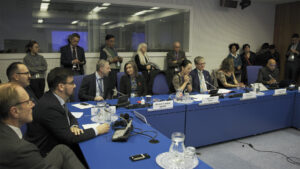The recommendations of the civil society on the new EU drug strategy have been presented to governments
The 7th meeting of the Civil Society Forum on Drugs was held in Brussels on 19-20 April. The meeting highlighted the need for a more meaningful involvment of civil society in the formulation of drug policies in Europe. A few days before the event, the representatives of the CSFD presented a common proposal to the EC and member states at the Horizontal Drug Group (HDG), a high-level drug coordination forum of the EU that meets regularly to discuss current drug policy issues. The proposal recommends funding and strengthening mechanisms for civil society involvement at the national and international level, including inviting representatives of civil society to national drug policy coordination forums. It urges governments to take a multidisciplinary approach in designing drug policies, that is to say, to involve a wide range of professionals from the fields of justice, social affairs, health, education, law enforcement and other sectors, including groups of people who use drugs. The CSFD proposes addressing the underlying social, health and economic inequalities, stigma and discrimination behind problematic drug use.
One of the issues highlighted in the document is human rights – the CSFD points out that, despite the fact that drug policies target and impact vulnerable groups of society, there is no systematic assessment of the human rights situation of people who use drugs and other affected communities in the EU. It proposes that the EC should conduct a human rights assessment of drug policies at the EU level and consult civil society in making this assessment.
The CSFD promotes the minimum quality standards for drug demand reduction developed within the EQUS project. These standards were presented at the meeting by Professor Ambros Uchtenhagen, the doyen of the Swiss treatment system and drug policy model. The set of recommendations addresses prevention, treatment / rehabilitation and harm reduction. Prof. Uchtenhagen explained how the implementation of these standards can be measured. CSDF asks the EC to facilitate and monitor the implementation of these standards in the EU.
The proposal was adopted by an almost full consensus of the CSFD – although a few NGOs did not sign the document or submitted minority statements on a few issues. ENCOD, a pressure group promoting the legal regulation of drugs, did not sign, because they considered that the proposal should have included a reference to alternatives to current prohibitionist drug policies. 17 NGOs supported a statement on the need to decriminalize the possession of drugs for personal use. Considering the deep ideological differences within the Forum, and the polarized debate on drug policies, the adoption of a common proposal of civil society is a great achievement in itself.
Posted by Peter Sarosi, Brussels



